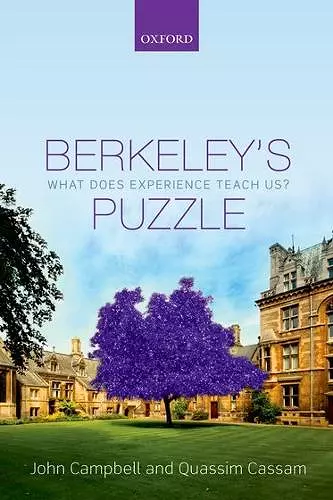Berkeley's Puzzle
What Does Experience Teach Us?
John Campbell author Quassim Cassam author
Format:Paperback
Publisher:Oxford University Press
Published:15th Sep '16
Currently unavailable, and unfortunately no date known when it will be back
This paperback is available in another edition too:
- Hardback£75.00(9780198716259)

Sensory experience seems to be the basis of our knowledge and conception of mind-independent things. The puzzle is to understand how that can be: even if the things we experience (apples, tables, trees, etc), are mind-independent how does our sensory experience of them enable us to conceive of them as mind-independent? George Berkeley thought that sensory experience can only provide us with the conception of mind-dependent things, things which cannot exist when they aren't being perceived. It's easy to dismiss Berkeley's conclusion but harder to see how to avoid it. In this book, John Campbell and Quassim Cassam propose very different solutions to Berkeley's Puzzle. For Campbell, sensory experience can be the basis of our knowledge of mind-independent things because it is a relation, more primitive than thought, between the perceiver and high-level objects and properties in the mind-independent world. Cassam opposes this 'relationalist' solution to the Puzzle and defends a 'representationalist' solution: sensory experience can give us the conception of mind-independent things because it represents its objects as mind-independent, but does so without presupposing concepts of mind-independent things. This book is written in the form of a debate between two rival approaches to understanding the relationship between concepts and sensory experience. Although Berkeley's Puzzle frames the debate, the questions addressed by Campbell and Cassam aren't just of historical interest. They are among the most fundamental questions in philosophy.
It is only if we understand experience as representing mind-independent reality, Cassam argues, that we can understand how experience can ground our thought of the world as mind-independent. Berkeley's Puzzle contains extensive discussion of how these views differ, and substantive arguments on each side. Written in a clear and unfussy style, it is a major contribution to the current debate in the philosophy of perception between relational and representational views of perception. * Craig French, The Times Literary Supplement *
Campbell and Cassam each offer elegant "solutions" to Berkeley's puzzle. * Jane O'Grady, Times Higher Education *
this book will prove very useful for advanced graduate students and faculty who do research on Berkeley, the history of empiricism, the theory of perception, and epistemology . . . Recommended. Graduate students and researchers/faculty. * M. A. Michael, CHOICE *
Though there are many excellent discussions of relationalism and representationalism, I am unaware of any that is superior to this joint effort . . . Its discussions are guided by genuine insight about which philosophical questions are valuable to engage and their responses to these questions involve an unusually high clarity of thought and attention to detail. The result surpasses what either author would have achieved independently and should serve as a useful model for other philosophers to emulate. * Christopher Frey, Notre Dame Philosophical Reviews *
ISBN: 9780198777564
Dimensions: 232mm x 156mm x 13mm
Weight: 336g
224 pages